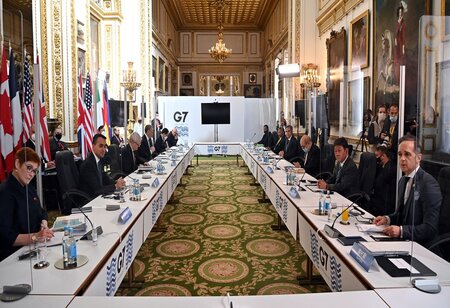Minimum 15% global corporate tax to benefit India to be backed by G7 says Experts
 The notable pact inked by G7, an association of the world's richest nations, to back a minimum global corporation tax rate of at least 15 per cent will benefit India as the effective domestic tax rate is above the threshold, and the country would continue to allure investment or expenditure, as per tax experts.
The notable pact inked by G7, an association of the world's richest nations, to back a minimum global corporation tax rate of at least 15 per cent will benefit India as the effective domestic tax rate is above the threshold, and the country would continue to allure investment or expenditure, as per tax experts.
The Group of Seven on Saturday reached a landmark deal to close cross-border tax escape clause used by some of the world's largest companies. The Finance Ministers of G7 countries, which comprise of US, UK, Germany, Canada, France, Italy and Japan, stated they would back a minimum global tax rate of 15 per cent for multinational companies.
Consulting firm AKM Global Tax Partner Amit Maheshwari stated that the pact is expected to benefit India as it is a huge market for a large number of tech companies, they agreed to put in place, plan to ensure taxes are paid in the countries where businesses operate, a move aimed at plugging loopholes in cross-border taxation.
Maheshwari said "It remains to be seen how the allocation would be between market countries. Also, the global minimum tax of at least 15 per cent means that in all probability the concessional Indian tax regime would still work, and India would continue to attract investment,"
In September 2019, India cut corporate tax for domestic companies to 22 per cent and 15 per cent for new manufacturing units. The concessional tax rate was extended to existing domestic companies as well, with subject to certain limitations.
Nangia Andersen India Chairman Rakesh Nangia said while the G7 commitment to global minimum tax rate of 15 per cent works well for US and most other countries in western Europe, it may face challenge from some low-tax European jurisdictions such as the Netherlands, Ireland and Luxembourg and some in the Caribbean which rely largely on tax rate arbitrage to attract MNCs.
The global pact would face the challenge of getting other major nations on the same page, since this impinges on the right of the sovereign to decide a nation's tax policy, Nangia added.
EY India National Tax Leader Sudhir Kapadia said the global corporate tax pact is a path breaking one, especially for large and developing countries like India which would always find it very difficult to keep corporate tax rates artificially lower in a bid to increase much needed foreign direct investments in the country.
Kapadia stated that "Even the recently announced lower rate of 15 per cent for new manufacturing units in India just about meets this new threshold, thus, not affecting this much needed boost to manufacturing in India. Equally important is the explicit granting of taxing rights to "market countries" for a share of global profits of multinational corporations, thus aligning right to taxation with place of economic contribution,"
The decision taken by the G7 countries will be placed before G20 countries, a group of developing and developed nations, in a meeting scheduled for July in Venice.
While the G7 agreement will have a lot of weight in the G20/OECD discussions, it would require a lot of work to reach global consensus, Maheshwari stated, Countries like Ireland are expected to have a challenging time and may oppose this minimum tax rate. However, a minimum tax of 15 per cent may not raise substantial revenues and there is a possibility that other countries may want a higher minimum global tax rate.
Deloitte India Partner Rohinton Sidhwa stated, the benefit of the minimum tax rate should accrue by first giving a right to tax a part of profit of large global digital MNCs. Besides, it will also bring an end to various digital taxes that have escalated around the world similar to the equalization levy in India, he said, adding that it will also pave the way for changes in global tax treaties pursuant to the consensus being reached.




